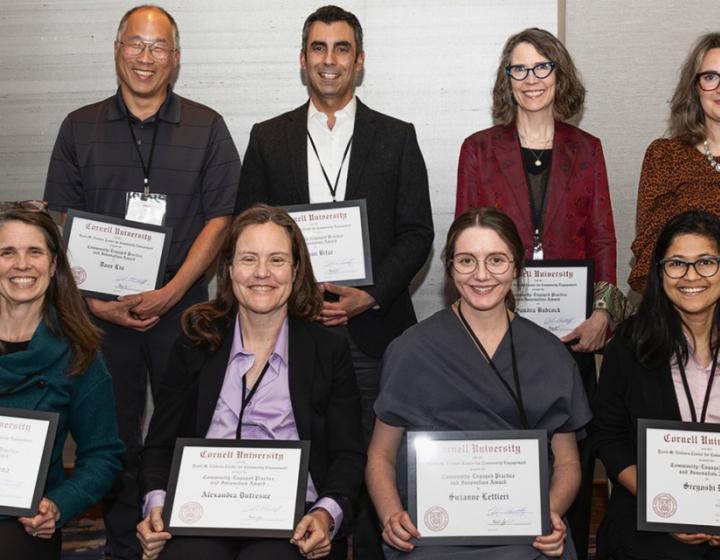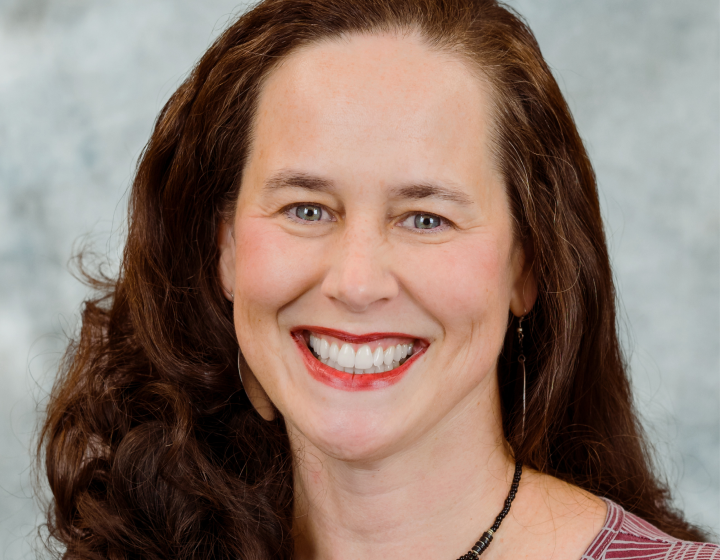2017 Fall New York State Veterinary Conference emphasizes implementation
More than 600 veterinarians, technicians, students, and vendors filled the Cornell University College of Veterinary Medicine’s freshly renovated halls, classrooms, and labs for the 2017 New York State Fall Veterinary Conference, held October 6 through October 8. “Implementation” was the theme of the meeting, and attendees left with new ideas and strategies they could directly apply in their veterinary practices and their lives.

The newly remodeled building was the perfect setting to host the bi-annual conference. “I can only describe it as breathtaking,” says Mitchell Kornet ’76, DVM ’79, chair of the College Advisory Council and Annual Fund. “I walked into the majestic atrium and looked at the multi-level classrooms and the spaces that were available to everyone at the meeting to congregate.”
The Heart of the Meeting
One of the new stadium-style lecture halls featured a session with interviews between Dr. Sydney Moise, a cardiologist in the Department of Clinical Sciences at Cornell and a co-chair of the conference committee, and distinguished cardiologists from the around the world. While watching speakers discuss the recommended use of certain heart drugs, new diagnostic recommendations, and a novel mitral valve surgery to correct heart failure in dogs, attendees enjoyed an array of desserts from each cardiologist’s home state or country.

Eminent cardiologist Etienne Côté, associate professor of cardiology at the Atlantic Veterinary College in Prince Edward Island, Canada, co-hosted the panel and gave talks on managing heart murmurs, appropriate use of the cardiac drug pimobendan, and navigating interactions with the client. “We have to keep in mind that there are two hearts in the exam room,” Côté says. “We still have the responsibility of assessing and treating the patient, but I find that I need to remind myself of the value of putting ourselves into the shoes of the client.”
Veterinary technicians also had ample opportunity to attend sessions on a range of topics ranging from dermatology to anesthesia to animal behavior, all while earning continuing education credits. Paula Plummer, a licensed veterinary technician at Texas A&M University hopes that her talks on feline health will give vet techs new methods they can apply in the clinic. “I enjoy giving lectures and talking to technicians about new ideas,” Plummer says. “Hopefully I inspire them to go back to their practice and make changes, even small ones.”

For the first time, the meeting featured a daylong lecture series on the health and care of honey bees. Due to new regulations from the U.S. Food and Drug Administration, antibiotics that were formerly available over the counter, now require a prescription. “We as veterinarians have a huge opportunity here to learn about bees and be able to provide services to beekeepers,” says Dr. Christopher Cripps, a former dairy vet turned bee specialist. Cripps taught sessions on the bacterial diseases and mite species than can infect a colony. Participants visited Cornell’s Liddell Bee Laboratory to see a hive in action and test for rates of varroa mite infestation.
Back in the Lab
The College’s extensive lab facilities made it possible for speakers to host hands-on activities for small groups during the meeting. In the clinical program center Dr. Nadine Fiani, assistant clinical professor, and Dr. Santiago Peralta, assistant professor, both in dentistry and oral surgery, gave a three-day laboratory course on companion animal dentistry. “It’s material that they will be able to start applying right away,” says Peralta. Their comprehensive class covered everything from oral examinations to radiology to tooth extractions.
Fiani finds is very rewarding to share these techniques. “It makes a huge difference to clinicians who don’t necessarily have the background or the resources to help them perform better within their own clinics.” says Fiani.
The course participants completed online activities beforehand so that they would have more time to ask questions and develop their skills. Margaret Zarouba, a veterinarian from Fairport, New York sees “too many” bad teeth in her practice and was excited to improve her dentistry skills. “It’s refreshing,” Zarouba says. “Since I’ve been in practice, things have changed and they’re doing new techniques.”

The equine track also featured small group activities to foster interaction between the speakers and participants. Dr. Edward Earley, a visiting lecturer at Cornell who specializes in large animal dentistry, presented a series of case studies, complete with radiographic images, photos, and scans. “I’m so blessed to work here at Cornell with all the different services available on these cases and I wanted to expose people to how we look at dental cases with all the specialties working together,” says Earley. Attendees analyzed the materials and made decisions regarding treatment for fractured teeth, extractions, and sinus issues.
Dr. Megan Shepherd, a clinical assistant professor of nutrition at Virginia Tech gave two lectures on equine nutrition and hosted lab sessions where vets evaluated forage quality, calculated the energy and feeding requirements for obese, starved, and senior horses, and discussed the plethora of supplement options available for horses. “There are so many out on the market,” says Shepherd. “It’s really hard for vets and owners to navigate through what’s helpful and what is safe.”
Implementing Life Changes
Following the meeting’s theme, the organizers planned an “Implementation of Life” track on Sunday to examine the financial and family planning challenges that veterinarians face. “It’s very important to have a sustainable career, and in order to have that you have to have a sustainable life,” says Moise.

The track began with a panel discussion on managing one’s finances throughout a veterinary career. In 2017, the average new DVM graduated with $181,000 in student debt, but the average salary has remained stagnant since 2011. These realities make it difficult for many vets to repay loans while still meeting life goals, such as buying a house and starting a family. New vets must also choose between joining an established practice or setting up their own. Dr. Margaret Thompson, assistant dean and director for hospital operations at the College, and the 2017 NYS Veterinary Medical Society president, thinks that students need better education regarding options for loan repayment and refinancing. “There are a lot of opportunities that are missed if people don’t talk to financial advisors,” Thompson says.
In the following session on fertility, Dr. Wendy Vitek, a reproductive endocrinologist at the University of Rochester Medical Center, spoke about the reproductive dilemmas that many professionals face. ” I definitely encourage women in their 20s to start thinking about fertility,” Vitek says. She advises that both men and women can prolong their fertile years by maintaining a healthy weight, limiting alcohol and tobacco use and preventing sexually transmitted infections. “If they manage those issues well, then hopefully their fertility will still be prime in their early 30s when they are ready to conceive.”
On the Lighter Side

Despite a full schedule of talks and labs, the conference organizers also planned networking activities and opportunities for downtime and socializing. Attendees could take advantage of free massages throughout the weekend, and enjoy the DeeDee Arrison Concert for the Animals on Saturday at lunchtime. The performance, sponsored by Clement And Karen Arrison, featured accomplished violinists and Grammy-nominated pianist Robert Koenig, and welcomed attendees and their well behaved pets.
At the celebration banquet on Saturday night, attendees enjoyed a dinner with Finger Lakes wine and beer while listening to the announcement of the annual awards. Drs. Donald Lien and Ann Dwyer won the Daniel Elmer Salmon Award for Distinguished Alumni Service; Dr. Francis Fasset won the Distinguished Life Service Award; Dr. Sydney Moise won the NYSVC 2017 Outstanding Speaker Award; Dr. Susan Wylegla won New York State Veterinarian of the Year; and Dr. Robin Sturtz won the award for Outstanding Service to Veterinary Medicine.

For meeting’s finale, attendees enjoyed the comedy and vocal stylings of father-daughter duo Dr. William H. Miller, medical director of the Companion Animal Hospital and Dr. Julia E. Miller of the Cornell University Animal Hospital. The senior Miller gave advice on practicing dermatology, interspersed with song parodies by the younger Miller. Their presentation, entitled “Top 10 Things in Dermatology I Will Teach My Daughter,” closed out the conference.
The conference organizers appreciate the support of the 29 participating vendors and thank Banfield, Best Pet RX, Merial, Monarch Business Consulting, and Simons & Associates for their sponsorship.
--By Patricia Waldron




